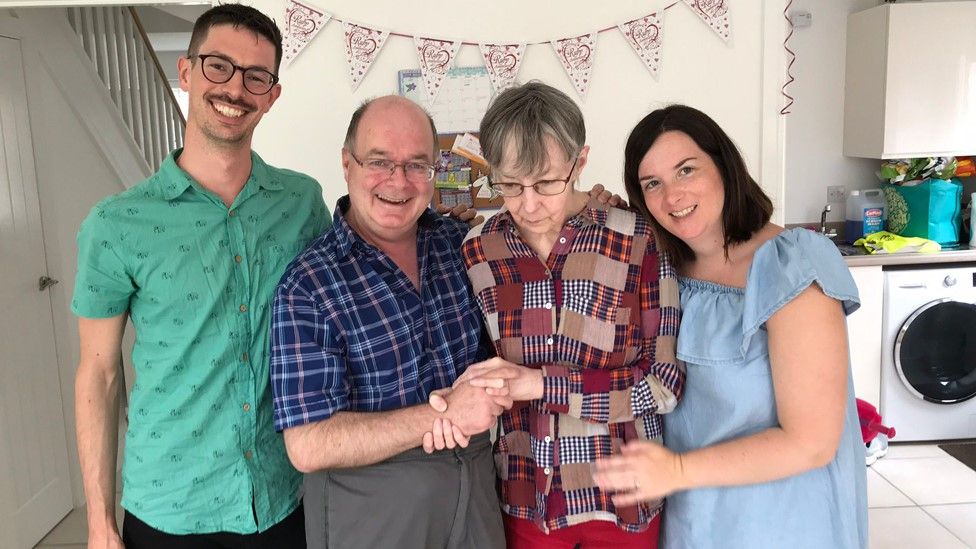ARTICLE AD BOX
 Image source, Jennings family
Image source, Jennings family
John Jennings, with his father Stuart, mother Carol and sister Emily
When John Jennings' mother started showing signs of Alzheimer's Disease at the age of 50, he and his sister Emily knew they too would also have a 50:50 chance of developing the condition that causes dementia. But a letter their mother wrote almost 40 years ago could hold the key to changing the course of the future for their family and thousands of others.
"You know you tend to get older people and they're buying a pair of shoes and they're like, 'Those will see me out'. I've basically always had that attitude," says 39-year-old John Jennings.
"I'm like, 'Shall I buy a new laptop?' - because I've had Macs that have lasted 10 years in the past."
John, who lives in Edinburgh with his husband Matt, is not bothered by material possessions because he doesn't know if he has inherited a faulty gene from his mother that could trigger early-onset Alzheimer's Disease.
"I've just found that the thing that makes me happiest is being around people who love me," he says. "So we just spend a lot of time building relationships and that seems to be the most fulfilling part of life."
But these social connections are the things John is most scared of losing if he does have the gene mutation and goes on to develop the condition in his 50s, like his mother Carol did.
"I'm trying to learn loads of languages and I'm obsessively exercising, I know for most people that would dramatically reduce my risk of getting Alzheimer's," says John, "but the fact of the matter is, for me, it doesn't make any difference."
For the majority of people, advancing age is the biggest risk factor in Alzheimer's. In every 100 people with the condition, less than 1% will have the inherited form.
Image source, Jennings family
Image caption,Stuart Jennings was a Methodist minister and the family would often relocate because of his job
In the 1980s, it was widely thought Alzheimer's Disease had no familial link, but when John's grandfather - Carol's dad - and his four siblings were all diagnosed with the condition in their 50s, Carol knew this couldn't be a coincidence.
A new documentary for BBC Two tells the story of how Carol, a teacher from Coventry, helped change the face of Alzheimer's Disease research with one handwritten letter. She had always tried to find solutions to problems, says John, it was "her way of getting some control of the situation".
In 1986, Carol wrote to a team at University College London (UCL) who were studying the disease. By analysing the genetics of her family, the team identified a gene in 1991 that all her affected family members shared. A mutation to the amyloid precursor protein (APP) gene meant too much amyloid protein built up in the brain, which clumps together to form plaques and causes brain cells to die.
Carol passed down a 50% chance to John and his older sister Emily, 42, of inheriting the gene mutation that triggers early-onset Alzheimer's Disease.
"If someone has the gene, they will develop disease at around the same time that their family members did," says consultant neurologist, Dr Cath Mummery, head of clinical trials at the Dementia Research Centre, at UCL.
"So they are aware of the ticking time bomb, especially as they near that age."
Image source, Jennings family
Image caption,John says he's so proud of everything his mother achieved in Alzheimer's research
"It's tempting to think if I discovered that I had it, that Emily didn't, and vice versa," says John. "But it could be that both of us do. It could be that neither of us do."
For those at risk of genetic Alzheimer's Disease, a blood test can be taken - after specialist consultation and counselling - to show if the genetic abnormality that causes the disease is present.
John's mother Carol chose not to take the test, as she believed there was no point in worrying, says John, but while he respects his mother's choice, it's not the route he wants to go down.
"We could have planned better if we knew that she had," says John.
Image source, Jennings family
Image caption,Carol became more isolated and timid as the disease progressed says John
He was 21 when his mother first started showing symptoms in the mid-2000s. Her condition slowly deteriorated until she became bedbound and couldn't speak.
Every stage of his mother's decline was "like a new tonne of bricks that you have to deal with", he says.
Carol passed away in March this year. She asked for her brain to be donated for scientific research.
John says he will definitely take the blood test at some point - it's just when - and he will decide on the timing with his sister. Now, is not the time.
"I think if one of us had the test then the other one would probably follow pretty quickly afterwards," says John.
"So it almost feels like it's a decision we need to make together."
Image source, Jennings family
Image caption,Stuart Jennings cared for his wife Carol as her condition deteriorated
The one thing that might bring forward John's decision to take the test would be if he needs to know his gene status to start any medical treatment.
He is optimistic about new Alzheimer's drugs that could be licensed this year. They have been engineered to help the immune system clear amyloid from the brain and slow the progress of the disease. There are potentially serious side effects and their effectiveness depends on early diagnosis - so it is still early days in terms of knowing what impact they will have.
While genetic Alzheimer's Disease is rare, it is similar in many ways to more typical Alzheimer's Disease that develops in other people later in life, says Dr Mummery, and can be used as a model to find new therapies.
"If we can find a treatment that works in this genetic form, then we might be able to extrapolate from that to a treatment for the more common, non-genetic Alzheimer's Disease," she says.
All this has stemmed from the work Carol started with the team at UCL, says Dr Mummery.
While work continues on the development of treatments, John's coping mechanism is to remain resilient and have a positive outlook. He also recommends sharing experiences with others at support groups.
He is continuing his mother's legacy, helping to change the course of the future, by taking part in Alzheimer's Disease research and having regular brain scans.
John says he feels we are "on the cusp" of seeing treatments that can help stop the disease in its tracks.
"I'd really like to live long enough to see that - and I think I might."
The Jennings v Alzheimer's will be broadcast on Monday 13 May at 21:00 BST on BBC Two. Or catch up afterwards on BBC iPlayer.
If you are affected by any of the issues raised in this story, support and advice is available via the BBC Action Line

 11 months ago
51
11 months ago
51








 English (US) ·
English (US) ·